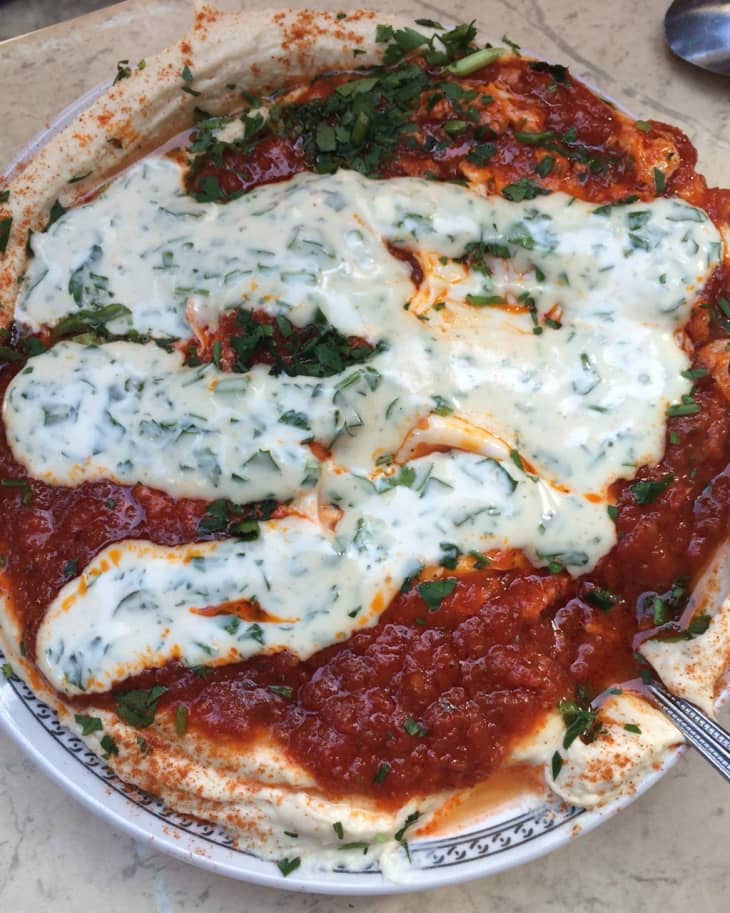Where to Find the Most Soulful Food in Tel Aviv
My first trip to Israel yields numerous culinary highlights, but it’s wandering through the markets of Jerusalem and Tel Aviv, each one bristling with distinctly charming character, which leaves me most captivated. And it is Carmel Market, or Shuk Ha-Carmel, with its sensorial barrage of shouts for straight-from-the-oven rugelach, wafting scents of garlic, and richly hued vegetables on display, I find especially soulful.
An Introduction to Carmel Market
Inbal Baum, American expat and founder of Delicious Israel, says that many of her bespoke culinary tours unfold at the nearly century-old Carmel Market. “It is not your sanitized, fancy Disney version of a market; this is still the real deal,” she explains. “The market and surrounding neighborhood of the Yemenite Quarter are chock-full of heartwarming stories of the families who have been running their shops for three or four generations.
“Some have had to change and adapt to the times, but others look and feel just as they would have back when they opened in the 1930s. You can meet a grandfather and grandson who are still working side by side, and it is a reminder of how hard-working, passionate, and proud these families are.”
I have limited time at the market, and so I am relieved that the overwhelming task of navigating it is simplified by the guidance of both Baum and Avihai Tsabari, another knowledgeable, food-loving guide who runs the company Via-Sabra.
“Carmel is the busiest market in the city. New places are welcomed, new people are loved, and the vibe changes constantly. From seasons and politics to holidays and weather, this market is alive and it becomes, especially on Friday, the beating heart of this vibrant city. It is a microcosm of Tel Aviv,” he says.
Where to Eat and Shop at Carmel Market
One could gladly spend hours tasting their way through Carmel Market, but some joints are more essential to visit than others.
One of these is Shlomo & Doron, a circa-1937 institution turning out transcendent hummus, with such clever renditions as the humshuka, an egg-topped hummus-meets-shakshuka.
Tsabari likes to bring all visitors here, as well as to HaShomer 1. “This is the place for real street food,” he points out. “Naor, the owner, makes his special kebab in fresh-baked challah bread, what the construction workers used to eat at the end of the day’s work one-hundred years ago.”
Baum also encourages market-goers to inhale the aromatic mix of za’atar spices at Teva B’ Carmel and dig their spoons into the thick rosewater-fragrant malabi pudding served at HaMalabiya. But it is lahoh, the spongy Yemenite bread reminiscent of Ethiopian injera, she ensures all her guests try at the hole-in-the-wall Irit’s Place. This pancake-like concoction is only heightened when plunked into Irit’s homemade schug, a fiery green pepper paste.
One “can’t help but walk away smiling” after meeting Irit, vows Baum. “She grew up in the neighborhood and it seems like every Yemenite person that walks by is her second cousin. She tells stories of walking out of her door and seeing goats and sheep wandering by when she was a kid. No words can really explain the magic of it.”
The Evolution of Carmel Market
A locale such as Carmel Market, where folks like Irit are comforting community fixtures, is clearly entrenched in nostalgia. Tsabari, for instance, fondly recalls walking through it as a child with his grandmother, “touching everything. But most of all I remember taking the bus back home. With the excitement of what was in our bags and the smell of the market still in my mind, I would sail away, imagining what we would make and what it would taste like.”
Baum’s 95-year-old grandmother is also a long-time Carmel Market devotee. Up until a few years ago, Baum says, Grandma would take the bus from a Tel Aviv suburb just to buy still-gurgling fish from one of the shops. When the owner passed away and the grandson stopped selling the live fish she killed at home in the bathtub, she was a customer no more. “With a skeptical face she asked me, ‘How can I know how long those fish have been dead for?'” says Baum.
As the market gears up for another century, this transformed seafood display is just one of the many palpable changes felt here. The arrival of M25, the swish butcher shop-restaurant selling and cooking high-quality porterhouses, and the abundance of Israeli-grown Latin and Asian produce like plantains and bok choy, are others.
While bourekas and falafel are still (and will always be) clamored for at Carmel Market, today’s open-minded shoppers are just as likely to seek out udon and arepas. Tel Aviv’s dining landscape is rife with international influences, and Carmel Market’s vendors reflect this burgeoning global outlook. As Baum points out, even Grandma covets green chicken curry at the Asian noodle bar down her street.
Still, I am happy for holdouts like the no-frills Café Cohen, where I am ensconced on a white plastic chair sipping a short, inky coffee when gregarious proprietor Shlomo Cohen spontaneously breaks into song. Typically, the trained cantor reserves his off-the-cuff operatic performances for Friday afternoons, but this morning he treats us to a preview with his powerful serenade of Ella Fitzgerald’s “Summertime.”
Although the coffee biz has fueled the Cohen family for more than 70 years, quality java is only one of the reasons to pop inside. Cohen’s colorful personality, combined with the decades of history permeating the space, make the tiny shop a must when visiting Tel Aviv’s Carmel Market.
